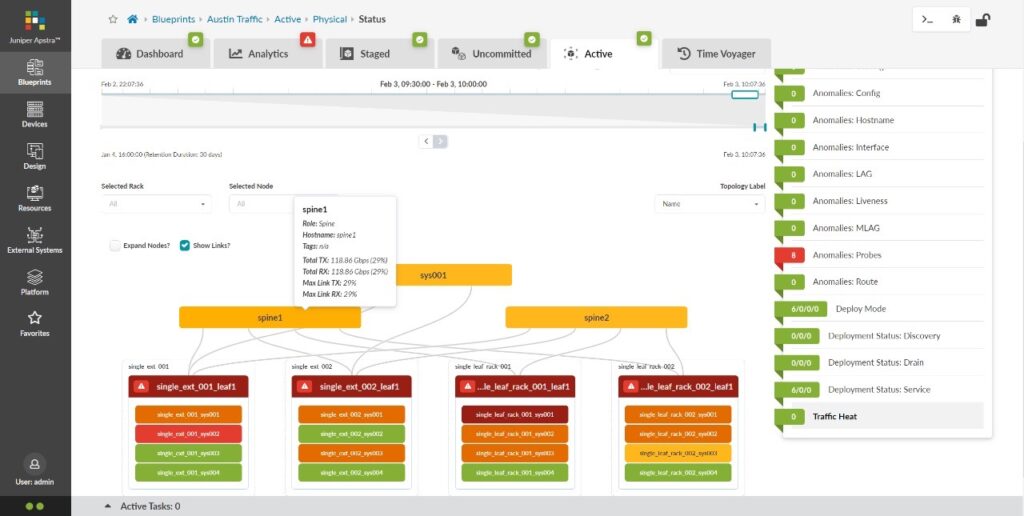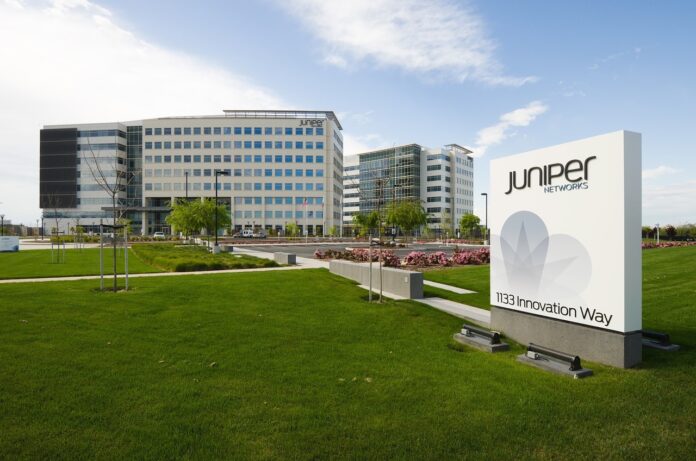The new expansion promises support for any data center topology
Juniper Networks this week announced Apstra Freeform, a new expansion to their intent-based data center automation and assurance platform. Apstra Freeform’s cornerstone feature is a new reference design that covers any topology, providing additional flexibility for DC operators, claimed the company.
Apstra is aimed at simplifying data center network automation by providing operations staff with a “single source of truth” and a simplified interface to observe and manage the relationships and interdependencies between millions of individual data center elements. The software is installed as one or a set of Virtual Machines (VMs) and connects and manages devices through the deployment of software agents. Built-in templates enable DC operators to design, then instantiate blueprints representing the actual physical network. Apstra produces device configuration info, provides an abstraction layer across different vendors and offers continuous validation against intent and policy assurance.

Juniper Networks says Apstra is the only solution of its type with multivendor support. Freeform takes the platforms in new directions by providing a much more flexible design experience, according to Ben Baker, Juniper’s senior director of Cloud/DC Marketing & Business Analysis.
“We had what we call these data center reference designs in Apstra,” Baker told RCR Wireless News. “They provided a heavily curated experience with guardrails, and they were for specific data center architectures.”
The new release has what Baker calls “an anything-goes reference design” instead. “Apstra now supports any data center topology, any protocol,” he said.
Baker continued that the development of Apstra Freeform was spurred by numerous client conversations, which revealed that Juniper’s customers increasingly have data center topologies and configurations that weren’t ideally suited for the pre-existing template system.
“The product roadmap is guided by the key challenges we’re hearing from customers and the people who design and run those data centers. Those challenges include, number one, the need for speed. We mean that in the broadest sense of the word: just the speed of business,” Baker said.
To that end, said Baker, Apstra Freeform focuses on reliability, consistency, and repeatedly with its intent-based design and network automation. Baker said that Juniper’s taken lessons from hyperscalers to drive that efficiency.
“One of the things we’ve learned from them is that if you want speed, you really start off with reliability, and that’s what we’ve done with Apstra is based on these blueprints that you create – any time you need a new data center, a new pod, a new rack, you stamp out that design and go with it. If you start with reliability, consistency and repeatability, the outcome is actually speed.”
Another area where Apstra Freeform can help, Baker said, is sorting supply chain management issues. Juniper already distinguishes Apstra from the competition with broad multivendor support.
“Uncertainty rules the day right now,” said Baker, of supply chain headaches. He pointed to cases where Juniper’s customers had to change vendors for products like network switches, when lead times for specific devices might grow from weeks to months, but substitutions from other vendors might be more readily available.
Fred: No longer the DC’s single source of truth
Apstra also serves a role for data center operators during a period of great workforce upheaval and change, said Baker. Apstra’s position as a single source of truth for network operations offers data center businesses a level of security they might not otherwise have.
“If your single source of truth is Fred, the guy who’s been there for 20 years, and if Fred leaves, Apstra can be the mentor for people who follow,” he said. “Apstra has helped our customers because they can’t hire their way out of those problems.”
Even aside from potential workforce upheaval, Baker noted that Apstra helps DC operators do more with less.
“There’s always more work to do. With Apstra, senior network engineers can go off to the higher level things, the more strategic things. Apstra is about removing the day-to-day toil,” said Baker.
In July, Juniper Networks announced Cloud Metro, a new converged services platform positioned at metro are network service providers looking to upgrade 5G services. Juniper called metro area networks “the ‘new edge’ where connectivity, distributed cloud, and customer experiences converge.”Challenges to metro area networks include expanded security threats, a shortage of experienced talent to manage them, and new International Telecommunication Union (ITU) carbon emission reduction standards.

